Donald Hargis Flanders
1924 - 2012
Donald Hargis Flanders was born April 26, 1924 in Memphis, Shelby Co.,
Tenn. to Henry Jack & Mae M. Hargis Flanders.
December 15, 1946 Don married Phala Kathryn Davis in Fort Worth, Texas.
His military career is given by him in a personal interview at Fort Smith,
Sebastian Co., Ar. It can be found at the bottom of this page followed by
some of the muster roles of the USS Gantner mentioning Don Flanders.
His last rank was Lt JG.
Donald Hargis Flanders passed away April 8, 2012 at Fort Smith, Sebastian
County, Arkansas and is buried in the National Cemetery there.
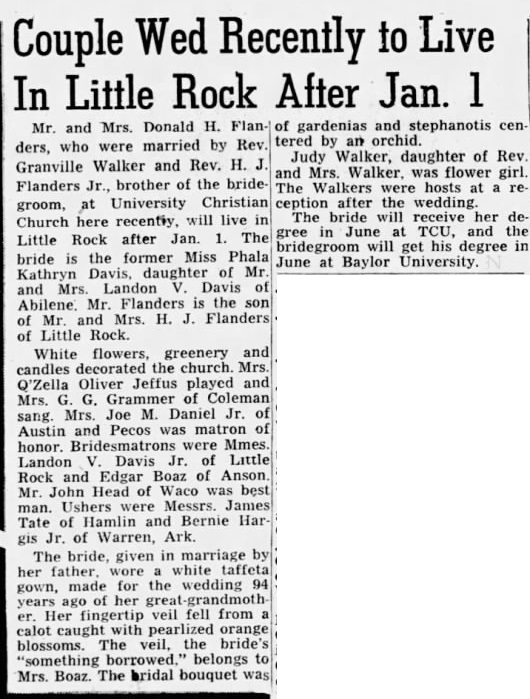
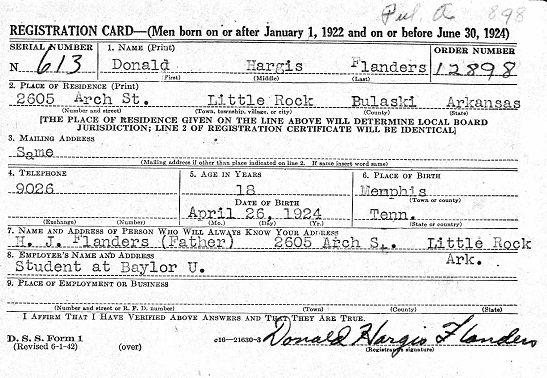
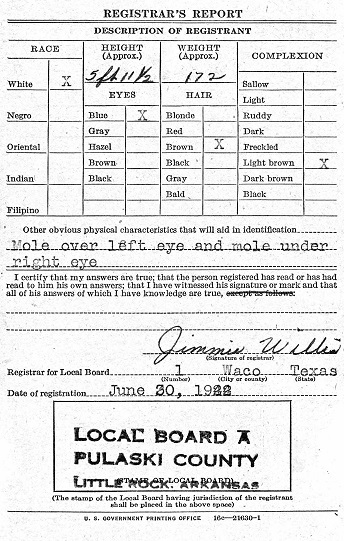

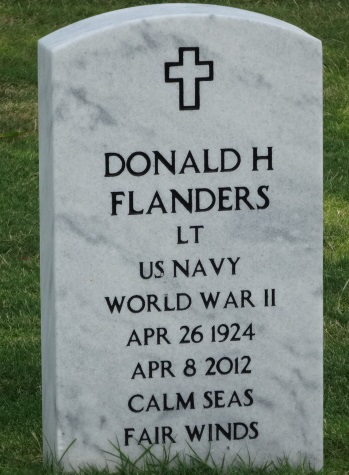
Find A Grave
Donald H. Flanders, 87, of Ft. Smith, passed away Easter Sunday, April 8, 2012, in his home.
An avid boater and devoted member of the Ft. Smith community, he is survived by son Don H. Flanders, Jr. and wife Valerie of Bangor, ME, son Dudley K. Flanders, Sr. and wife Charlotte, of Ft. Smith, daughter Kathy Flanders, of Fayetteville, granddaughter Gretchen McGinnis and husband Sean, of Denver, CO, granddaughter Bridget Mercandetti and husband Mike, of Castle Rock, CO, grandson Dudley K. Flanders, Jr. and wife Tanya, of Ft. Smith, granddaughter Jessie Y. Flanders, of Memphis, TN, granddaughter Shelby Lane Varner, of Fayetteville, and seven great-grandchildren.
Don was a prominent businessman and philanthropist. He graduated from Baylor University and served his country with pride as a Lt. S.G. in the Navy during WWII. In 1954 he and wife Phala founded Flanders Mfg. Co., which became one of the largest case goods companies in the Southwest. That company was sold in 1969 to become part of Riverside Furniture. In 1970 he founded Flanders Industries, which, as the brand Lloyd/Flanders, has become the largest manufacturer of wicker furniture in the U.S. and one of the most prominent brands in the casual furniture industry.
Don was very active in industry associations and served as chairman and director of the Southwest Furniture Manufacturers Association, served on the Board of Governors of the Dallas Market Center, founded the Ft. Smith Manufacturing Executives Association, and served as chairman of the Summer and Casual Furniture Manufacturers Association. He served as the head of the Arkansas Industrial Development Commission from 1980 through 1982. Don has been honored as a recipient of the Lifetime Achievement Award by the Summer and Casual Furniture Manufacturer's Association and recognized as an Industry Fellow by the American Furniture Hall of Fame.
In addition to his numerous professional accomplishments, Don was a world traveler and a man of devout faith who lived a life of service. A dedicated volunteer member of the Boy Scouts on the local, regional, and national level, he was a recipient of the Distinguished Eagle Scout, Silver Beaver, Silver Antelope, and Silver Buffalo awards. An Eagle Scout himself, Don was extremely proud that both his sons became Eagle Scouts as well.
The Ft. Smith community held a strong place in Don's heart, and he served on the boards of First National Bank, Sparks Health System, UAFS Foundation, The United Way, The Chamber of Commerce, Hardscrabble Country Club, and the Administrative Board of First United Methodist Church.
A visitation will be held from 5:30-7:30 p.m. Tuesday, April 10, 2012, at the narthex of First United Methodist Church.
The Memorial service will be held at 2 p.m. Wednesday, April 11, 2012, at First United Methodist Church, under the direction of Edwards Funeral Home. Private burial will be in Fort Smith National Cemetery with Military Honors.
Honorary Pallbearers will be: Dr. Bill Klusmeier, Dr. J.P. Chancey, John Boots Kessler, Gene Davenport, Harry Shipley, Jim Alexander, Tim Gower, Dr. Bill Culp, and Doug Parker.
The City Wire 4-8-2012
~~~~~~~~~~~~~~~~~~~~~~~~~~~~~~~~~~~~~~~~~~~~~~~~~~~~~~~~
World War II Veterans History Project
The Fort Smith Historical Society
Interview with Donald Hargis Flanders
http://fortsmithhistory.org/index.html
CB: Mr. Flanders, if you would please, give us your parents' names.
DF: H. Jack Flanders and Mae Hargis Flanders.
CB: What was your birth date?
DF: (DELETED CONTENT)
CB: And where were you born, please.
DF: In Memphis, Tennessee, in Shelby County.
CB: And did you have brothers and sisters?
DF: I had one older brother who had been born in Malvern, Arkansas, and he just passed away week before last.
CB: What was his name?
DF: It was H. Jack Flanders, Jr.
CB: And where did you go to school?
DF: Went all the way through school in Little Rock. My parents moved to Little Rock when I was six months old and I went completely through the school system there. I graduated from Little Rock High School. In May 1941, I went to Baylor University on a music scholarship playing the trumpet. I started in September 1941. December the 7th, 1941, is when the Japanese bombed Pearl Harbor. And therefore, I had to accelerate all my studies that I was taking. We had to decide what branch of service we wanted to go into. I had been active in Scouting and in Sea Scouting when I was in high school so I had an affinity for the Navy. I joined the officer training program of the Navy, it was called V-12. The Navy said they hoped to leave us in college at least for two years before they called us out to go to Midshipman's School. But it didn't last that long, it lasted one year. In July '43, they ordered me to Texas Christian University to the V-12 program there as an Apprentice Seaman. I stayed there until the following December. The Navy shipped me to Asbury Park, New Jersey, to a Pre-Midshipman's School at Asbury Park. The first of April, I was sent to Columbia University in New York City for Midshipman's School there. I graduated August the 10th, 1944. I was Company Commander of the 7th Company in the 19th class at Columbia. From Columbia, after I was commissioned, the Navy sent me to Sub Chaser Training Center in Miami, and trained on antisubmarine warfare. In October, I was stationed aboard the USS Gantner, which is a Destroyer Escort 60 (DE-60). It was operating out of Casco Bay, Maine. We made the convoy run between Casco Bay, Maine, to Londonderry, Ireland; this is at the very northern part of Ireland. We acted as convoy protection.
CB: How long did you do that?
DF: From December to April, the worst five months of the year! The seas were sometimes taller than the masts of the ship!
CB: And you were on a destroyer?
DF: Destroyer Escort. We were a little bit smaller than a destroyer (306 ft. long). The water was so cold that if one fell overboard, the 2 ship could not turn back. You'd be frozen by the time the ship could go back to get you. So if you fell overboard, you were gone! We had to wear face masks, and we had a little flap over our mouth that you could open up. If you smoked a cigarette, you could take a puff and then go back and snap it shut. The ship rolled 30-40 degrees all the time. Although we were supposed to eat at a wardroom table in the wardroom, the officers were never able to do that after we left the sea buoy. We were rolling 30-40 degrees. We had to sit on the deck of the passageway with our feet on a bulkhead on the other side. They'd pass sandwiches and half-cups of coffee up to us. That's the way we would eat. We had to put our pillows on either side of us in our beds because we were rolling back and forth. Moving through the seas, the ship would sometimes leave the water. When it was hanging out in the air, some ships would hog and go down by the bow, and others would sag and go down by the beam. We would go down by the bows. This would take the slack out of the cable from the whistle in the wheelhouse to the stack, and it would crack the whistle. When you heard "oooh, oooh, oooh, oooh", you knew you were in mid-air. Then the ship would come down and crash and hit the bottom. So you had to sleep, or try to sleep, through all that and still serve watches and do other work. That was the worst five months of my life. We were making submarine attack runs. We were never confirmed having sunk a sub. We did get oil slicks a couple of times, but we never could be certain that we had sunk it. I was gunnery officer, so I was in charge when the ship was on the sub attack. Then the Navy converted our ship to an Attack Personnel Destroyer in Yonkers, New York. Same ship, but it was turned from the DE-60 to the APD-42, Attack Personnel Destroyer. We carried Underwater Demolition Teams (UDT), the forerunner group for the Seals in the Navy. The UDTs would go in before the invasion and blow up the beach obstacles wherever the invasion was going to take place in order that the boats, the LCPs that were used in the invasions carrying the troops, could get up on the bank and not be trapped out in the shallow water. We also escorted a floating dry dock from New York to the Panama Canal. From the Panama Canal, we went around to San Diego. Then we joined some other APDs and went to Hawaii and trained off the coast of Maui in Hawaii for some time, preparing for the invasion of Japan. We were in Eniwetok when we got the word that the atomic bomb had been dropped, and we were ordered to go into Tokyo Bay. We sailed into Tokyo Bay and were there for the signing aboard the Missouri. There, in that harbor, were more ships than I ever knew the Navy could possibly have. There were thousands and thousands of ships! Before, we might see an aircraft carrier once every three months. Here, there were twenty or thirty aircraft carriers, and ten battleships that you could count out, and destroyers by the hundreds. There was never a prouder moment than when I looked out and saw what a magnificent Navy we had. We were in Tokyo Bay for just a few days. On board our ship, we carried an Admiral who was in charge of all the Underwater Demolition Teams in the Pacific.
CB: Who was that?
DF: McClaughrey, Commodore McClaughrey. We were ordered to go north to Hokkaido and accept surrender. We then went out of Tokyo Harbor, up the coast and dodged the mines everywhere because there were mines everywhere. We sunk a bunch of mines, we went up north of the top of Honshu, which is the island that Tokyo is on, north to the southwest corner of Hokkaido, the island just north of Honshu, to a little port called Otaru. We accepted the surrender of Hokkaido. As we came into the harbor and dropped anchor, a little tug came out. It had on board about ten or twelve Japanese officials with top hats and split tailed coats, getting off the tug. They brought some swords and presented them to the Commodore. We weren't sure the Japanese were sure the war was over up there until that happened. I was the gunnery officer, so I was put in charge of collecting all the ammunition and explosives that existed on Hokkaido, and we dumped them at sea. We went out every day with a tug and two barges and dumped it. We had done this for weeks. Then one time, I was watching the second barge. There was a Japanese worker who had a tray of fuses (like the end of a 20mm shell.) He was opening the lid and throwing them overboard. I hollered to the interpreter to tell him "keep the lid closed" so that the fuses wouldn't hit against each other. I turned back away from it and that's the last I remember. Explosions started blowing everything up on top of the barges and everything in the water that we had already dropped there. The second barge completely disappeared. Our executive officer, Bill Kendall, from Nashville, Tennessee, had decided he wanted to go on this particular trip. He had stepped over on that other barge. I found him floating in the water. I saw a hand floating and I wasn't sure whether there was a body attached to it. I jumped in and sure enough he was there, but he was terribly injured. The whole right side of his face was torn out, I could see his teeth. I had to hold his aorta to stop the bleeding. His whole right side was riddled with injuries. We then signaled, (the first time in my life to use the semafore I had learned in the Boy Scouts), I signaled the ship to send the doctor out there and they did. Bill Kendall survived. He lost his eye and was terribly injured, but he lived until last year, I went to his funeral. I got a call from one of his daughters. They were thanking me for saving Bill's life. If I hadn't done that, they would never have been born. They wanted to know if I could come to the funeral, so I did go to Nashville to go to the funeral. We did the honors to Bill Kendall there. Sometime after the explosion, I went up to the fly bridge of the ship to relieve the deck. We were at anchor in Otaru. The wind was up and I went up to relieve the watch on deck. I looked at the weather report and there didn't seem to be anything threatening, but then I checked the bearings of the ship and the bearings had changed. I then went down on the fo'c's'le to put my foot on the anchor chain and I could feel the anchor chain shaking, which means that we were dragging anchor. I went back and told the watch officer I refused to 4 relieve the deck because I thought we were dragging anchor. We only had one boiler on line and I wasn't sure we could stop the dragging. We were in a typhoon. He called the Captain, and the Captain came up to the bridge. The Captain called me everything but a nice man, and said you crazy "--". He tried to get the other boilers on line, but by that time the storm caught us and took us broadside against the bank. On our way in, we had these four LCP boats that were used by our frogmen. We let them down and used them to pull ourselves off broadside to the bank. We were the only ship there, so we had to look after ourselves. We were able to pull ourselves off. We did damage our propeller, but at least we survived the typhoon. We stayed up there until the Army came in. In November, we made the trip back to the States and got back to San Diego in December '45, just before Christmas. We started carrying dischargees from San Diego to San Pedro, which is the port for Los Angeles, where they could go home. We ran back and forth. I didn't have enough time in service to be discharged until they let me out in July of 1946. I came back and was separated, I was a Lieutenant JG at that time when I was separated. The next year in the reserve, I was made a full Lieutenant, which is equivalent to a Captain in the Army or the Marines. You asked if I ever were involved in any battles. We actually were not. We did operate and served many actions against submarines and a couple of actions against kamikaze Japanese planes, but we were very fortunate. However, if the atomic bomb had not been dropped, we were scheduled to put the first Americans to the mouth of Kyushu. They expected to lose five ships getting the first ones in there. There was no question but that we would have been killed, and certainly a million other Americans would have died, too, had the atomic bomb not been dropped when it was.
CB: You were in the first ship that would have gone in?
DF: Yes. The Underwater Demolition Team's boats go in to blow up the beach obstacles, so that the invasion, when it took place, could get up on the beach. We were going to have that honor. So there's no question but what President Truman saved my life when he dropped the bomb.
CB: And probably millions of others.
DF: They claim at least a million Americans and three million Japanese would have died if he had not dropped it.
CB: What kind of problems did you have with subs? Can you tell us some detail about it?
DF: When we were on convoy duty, we had a sonar perimeter in which we would look for the subs. If we got a sub contact, we would make a run on it. We had three ways to attack the sub. We had on the bow a group of sixteen "hedgehogs" we called them, but they were rockets. And we could fire that pattern of rockets forward and they would go down through the water. If they hit the sub, they would, of course, detonate. If it didn't hit, then it didn't detonate, and we would not 5 lose contact with the sub. Otherwise, we would attack them with K guns, which are the guns that go out from the side of the ship or the depth charge racks which go out the stern. When you drop those and they explode, then you lose all contact with a sub. You have to reestablish that later, and that's when you can lose it. We did carry torpedoes as a destroyer escort, but we never did use the torpedo against an enemy. We also had 5"-38mm deck guns.
CB: Were you attacked by a kamikaze?
DF: Yeah, in Eniwetok. That is hairy.
CB: I imagine. Were you able to shoot it down before it hit the ship?
DF: It did not hit us. We had one miss us a hundred yards maybe, but we did not get hit by one. There were a lot of ships sunk that day by the kamikazes.
CB: Did you go into Tokyo?
DF: Yes.
CB: You landed in Tokyo?
DF: Yeah. Well, we anchored in Tokyo Bay and then took our ship's boat in and we toured a lot of the Japanese ships that were there. We walked and saw the Imperial Palace and MacArthur's headquarters and a lot of the desolation. I got some pictures that were taken there in Tokyo. We came back to the ship, and we didn't stay in Tokyo that long, I don't remember how long, just a few days, when we were ordered to go up to Hokkaido.
CB: How were the Japanese people that you saw in Tokyo?
DF: Hungry. Most of them that we saw (particularly the kids) were real pitiful looking. We took candy bars and cigarettes and stuff like that with us and we traded them for different things; but the Japanese people really had suffered. Dropping of the bomb was as good for the Japanese as it was the Americans.
CB: What was their behavior toward the Americans?
DF: They were very subservient type. There were not any problems. Up in Hokkaido, we had called in all the arms. I was looking out the window of this little building and saw this Japanese officer with a sword on and he was supposed to have turned it in the day before. We went down and I took his sword away from him and there was no incident involved. So the word that the war was over was genuinely accepted by the Japanese people.
CB: Do you think the civilian population was aware of what atrocities had been done by their Army and their Navy?
DF: I have no way of knowing that. Course we had all been told never be taken as a prisoner, because you probably won't live if you are. None of the Japanese ever surrendered or virtually none of them did. They died to a man at Okinawa and Tarawa and everywhere else. I think they believed they were ascending to some part of Heaven if they were 6 killed in combat.
CB: Were you in contact with any of the American POWs that were returned?
DF: No, we had no contact with any of them. We had contact with Americans after they came back to Arkansas, but I was very fortunate to have gone through the war and come out unscathed. The training that I got in the service was outstanding. And I remember serving as a senior watch on the ship, I was not yet 21 years old, and I was in charge of the ship. We had 12 officers and 250 crew. I think they said the ship cost seven million dollars at that time, and I had command of the ship and I couldn't even vote yet.
CB: That's a pretty good responsibility for a kid 21 years old.
DF: But having that much responsibility, it changes you as a person. And I think that's the reason most people, when they came back, were dedicated that they were going to make something happen with their lives. And I personally felt so blessed that I had survived this explosion that should have killed me. I felt that God had spared me for more important things in life than that, so it turned out to be a blessing.
CB: Well, you have contributed quite a lot. Your work with the Boy Scouts has been unusual.
DF: Well, we learned something in scouting when you're camping out, you always want to leave the campsite better than you found it. And I've always kind of taken that as a mission in life in that everything I touch, try to leave it better than I found it. It's kind of been my motto.
CB: When you got out of the Navy, where were you?
DF: I was separated in Memphis, Tennessee, and came back to Little Rock, where my home was. I went on to Waco, to Baylor, to finish up my college career. I learned to fly while I was still in the Navy when we were back in San Diego and couldn't be brought home that last year. I learned to fly in a Stearman, a bi-wing plane, for $45 an hour. So I had a pilot's license by the time I got out of the Navy.
JW: You paid $45 an hour to take lessons?
DF: And it was in a Navy plane that they train their own pilots on, that bi-wing, crop duster plane is what it was.
CB: Where were you when Pearl Harbor was--
DF: I was at Baylor in my room at Brooks Hall at Baylor. We got the news on the radio and we knew that our lives were going to change from that moment on. That's a funny thing, bringing that up. The day we got the word of the bombing of Pearl Harbor, my suitemate, (the rooms at Baylor had three students in one room, a bath and three on the other and they all shared the same bath), my suitemate was a fellow named John Andrews, and his brother was Dana Andrews. Dana was just starting out in the movies and he was there visiting Baylor. John got the word about going into the service at the same time when 7 Dana Andrews was visiting him there. His brother, John, and my roommate, were both killed in World War II, and I lost four of my roommates at Baylor in World War II.
CB: What was the general reaction there at Baylor to the news?
DF: It was kind of the end of the world. They didn't know what was going to happen to the school or what we were going to have to do. And we immediately started debating about whether we wanted to be in the Army or the Navy. We knew we were going to have to be in one or the other. Suitemate of mine was killed in World War II, a few weekends before I joined the Navy, he decided to go to Dallas with other guys that were going up to enlist in the Marine Corp. But he wasn't going to enlist, he was just going to ride along with them. But they talked him into joining while he was up there, and he joined the Marine Corp. And then of the three people that were there at that time, he was the only one that was killed in World War II. He was a marine pilot, his name was Marion Pearce, from Navasota, Texas.
CB: When you were released from the Navy and went back to school, where did you go after you got your degree?
DF: Well, I lacked twenty hours of getting my bachelor, business administration degree, and I got that-- Baylor was on a quarter system, it had three quarters. I took twenty hours in this final quarter and completed my work December the 7th. I got married December the 15th in Fort Worth to a girl that I had met while I was in the V-12 program at Fort Worth.
CB: What year was that, '47?
DF: '46, December '46. We honeymooned in Hot Springs and came back to Little Rock. I worked in Little Rock for six months. Then got into the furniture manufacturing business with Mr. H. L. McCoy.
CB: Where was that?
DF: In Benton, Arkansas, which is about twenty miles southwest of Little Rock. I worked there until September 1950 and then I got a chance to come to Fort Smith to go with Garrison Furniture and Frank Grober. I came to Fort Smith then. And I was with Garrison for four years. I then decided I wanted to start a plant of my own. I started from scratch with my wife in the office and three men in the plant. We built our own samples and started making living room desks.
CB: Is this 1955?
DF: '54.
CB: Flanders Company?
DF: Flanders Manufacturing Company, Inc., uh-huh.
JW: Was that on Wheeler then?
DF: No, it was on North 32nd Street. I bought the Wheeler Ave. plant in 1970.
CB: What all did you manufacture as you grew? 8
DF: We started out making living room desks and then we got into bedroom and then into dining room. We were selling our product with Riverside Furniture. They were making occasional tables. We used the same representatives and displayed together at the markets. Then Riverside, in 1968, sold out to Arkansas Best. Later on, I decided I'd do the same thing rather than continue on. I left and then bought the plant, Williams Manufacturing, in 1970, and operated it.
CB: When did you become Lloyd/Flanders?
DF: Lloyd/Flanders in 1980, Frank White was elected Governor, he beat Bill Clinton. He asked me to come to Little Rock and run the Arkansas Industrial Development Commission. My son, Dudley, was coming along then, I was anxious to get Dudley out of my shadow so that people would answer to him and not to me. Also, I wanted to find out if I had any political ambitions. So I took this job, went to Little Rock for two years while Frank White was Governor, until he was defeated. And at that time, the oldest furniture manufacturing plant in the United States, Heywood-Wakefield, took bankruptcy. They owned a plant in Menominee, Michigan, which made a wicker product, a wicker chair. And I had a representative who had represented Lloyd. I had been intrigued by this unique product. We went up and bought the Michigan plant. We wanted to buy the process, the wicker process, from this bankrupt organization, but they would only sell the real estate and everything. So we bought the real estate and everything in 1982. We started manufacturing the wicker product, and it was called Lloyd Manufacturing. We took it over and we changed it to Lloyd/ Flanders Manufacturing. Marshall Lloyd, who started the process, had started the plant in 1906. That plant now is a hundred years old. He had sold the plant in 1924 to Heywood-Wakefield. That plant had prospered down through the years. The plant now has about 500,000 square feet.
CB: Where is that located?
DF: Menominee, Michigan, sixty miles due north of Green Bay, Wisconsin, in the Upper Peninsula.
CB: That's really interesting. Heywood-Wakefield Furniture now is highly collectible.
DF: Its plant was in Gardner, Massachusetts.
CB: When did you become active with the Boy Scouts?
DF: Well, I was active in Boy Scouts all my adult life. Growing up, I was a Cub Scout when it first started and made Wolf-Bear-Lion with all three ranks. I then went into scouting. I became an Eagle Scout. I then joined the Sea Scouts and got up to First Mate in Sea Scouting. I was not active as a volunteer in the Boy Scouts until I came back after World War II. In Benton, I worked with a scout troop there when I was with McCoy Couch. I then became real active in the Boy Scouts in Fort Smith in 1962. I was District Chairman and then Council President and then I became Regional President and then went on National Board for thirteen years. I was National Chairman of Cub Scouting, and I formed 9 the National Eagle Scout Association for the national movement in 1972. I was real active in scouting all my life except for that segment of time when I was in the service and in school.
CB: Well, in your boating experience, you were active in training people with the Coast Guard Auxiliary?
DF: Yeah. I have a pilot's license and I also have a captain's license with the Coast Guard and the Merchant Marine. I'm qualified for command of a vessel 200 tons and 200 miles offshore.
CB: Well now, how did that happen?
DF: Well, along the way, since my Navy days, my Navy time counted, and then all my time on the water since then was added into it. And I took several training courses. I'm a qualified diver, also. I have two sons and we all got qualified at the same time. I had a sailboat in Florida since 1986 and sailed it for several years.
CB: Really? What kind of sailboat is it?
DF: It was a fifty-five foot motor sailor.
CB: Fifty-five foot?
DF: Uh-huh.
CB: How many masts would it have?
DF: Two, a ketch rig.
CB: What fun. And you still have that?
DF: No, I got rid of it few years ago. Got a motor cruiser, what I call a "stink-pot" motor boat. It's a forty-five foot. It got wrecked in Hurricane "Charlie." Our home in Florida was in Punta Gorda, and that was hit two years ago (2004). They clocked 186 mile an hour winds in the cove right behind my house. It wiped out the whole top side of that ship. It took me a year and a half to get it repaired. Three weeks after I got it repaired, this man came up, says, "I want to buy your boat." And I said, "Well, okay, if we can arrive at a price." He said, "What do you want for it?" And I told him, and he said, "I'll take it." He was from Pascagoula, Mississippi, he was wiped out in the storm, his business, his boat and his house. He and his wife were going to live aboard it until they could get reestablished. So right now, this is the first time in fifty years I don't have a boat. I don't have one right now.
CB: And this guy's got a house now?
DF: Yeah. He got his house built.
CB: That's neat. How many children do you have?
DF: I have three children. Have Don, Jr., lives in Arizona. And Dudley, who lives here and in Michigan. And then a daughter, Kathy, Kathy Cotten, in Van Buren.
CB: Is that Kathy with a C or K?
DF: With a K. That's a different Cotten.
CB: Who's she married to?
DF: Larry Cotten.
CB: They live here?
DF: In Van Buren.
CB: And Don, Jr., lives in--
DF: In Phoenix, Arizona.
CB: Are any of them in the furniture business?
DF: Dudley is with me. He runs the company now. I just look over his shoulder. Then I have five grandchildren. And as of this morning, I have my first great-grandson.
CB: Well, congratulations.
DF: He was born at two o'clock this morning in Denver. I have a great granddaughter and--
CB: So this makes two great-grandchildren?
DF: Well, it actually makes three. But two actually, one by marriage. My grandson married a girl who had a daughter and we have adopted her.
CB: Right, that's great.
DF: But this is the first grandson.
CB: You've had just a really good life.
DF: You bet.
CB: You think serving in World War II served you well?
DF: Yes. The fact I came out of it unscathed was one of the greatest experiences that I had. I'm not opposed to everyone having military service, I believe it's good, it's great training.
CB: Good discipline.
DF: You learn the discipline and you learn how to lead and motivate. When your life depends on it, you learn how important training is. And being a gunnery officer, that was my job. You either defend yourself or you die, so that's a good motivator.
CB: What's your advice to young people growing up today?
DF: Learn as much as you can in typical courses, but learn as much as you can also from everyone with whom you come in contact. Everyone that you meet along the way is going to play a part in your life, maybe significant or insignificant, but they're going to play a part. You need to profit from their experience. Don't be afraid to pay a price for achievement. I think sometimes the young people want things to come too easily for them. But once you've paid the price for it, the earning of it is a lot more dear than if it is handed to you on a platter.
CB: Good advice.
JW: I have one question, I guess you answered it. You were in Tokyo Bay the day the war ended?
DF: Yes, the flag flying on the ship is upstairs in a frame.
JW: So that takes care of that question that I always ask.
CB: Well, we thank you so much for such a great interview.
DF: You're welcome. I'll show you this stuff in here, and if you want to go upstairs and see that stuff there, you're welcome to do it.
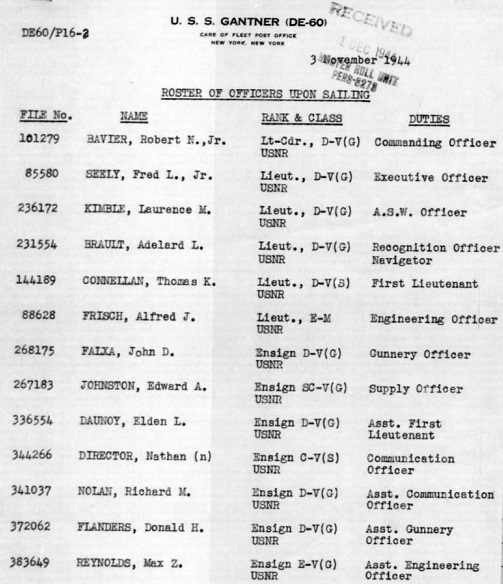
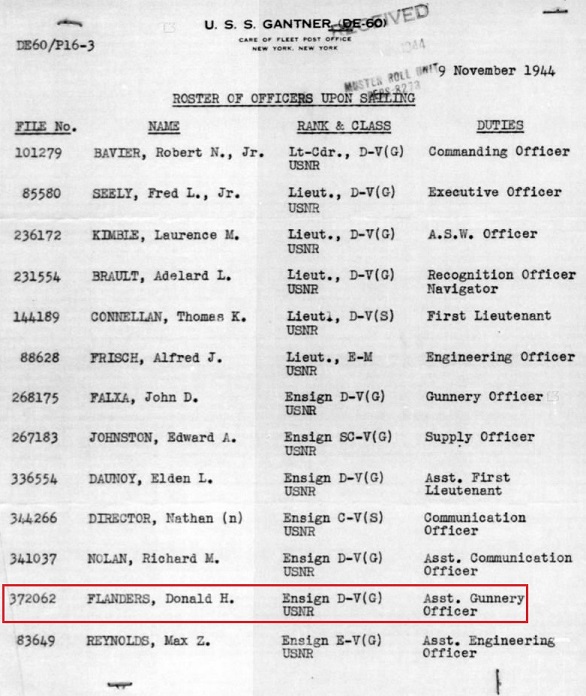
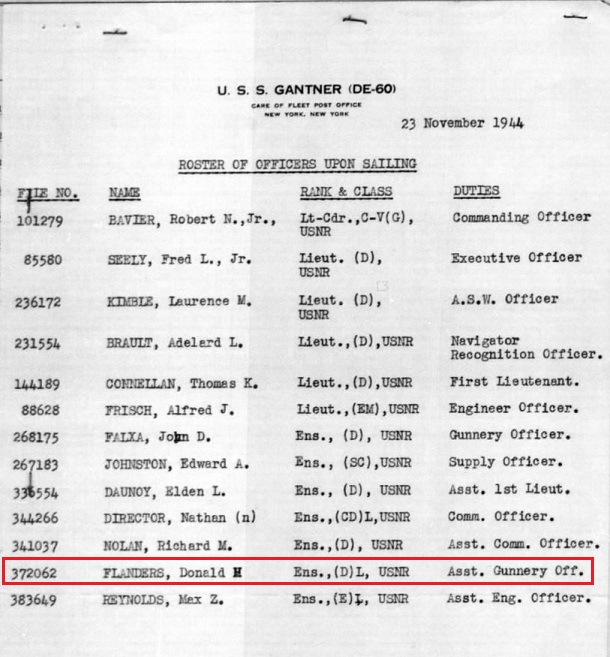
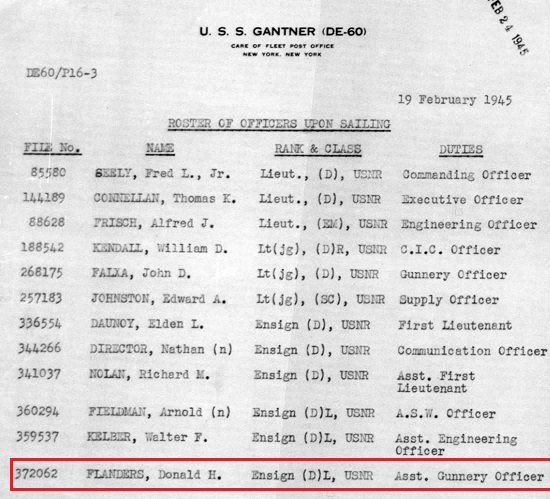
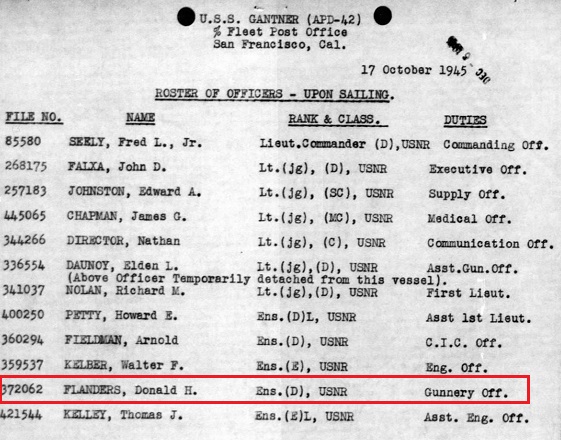
|
|
|
|